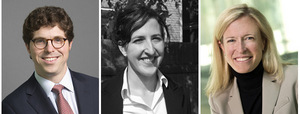
By Andrew Cohen
Andrew Bradt, Rachel Stern, and Amanda Tyler each had to deal with the stress of moving across the country to teach at Berkeley Law. But, without exception, the new faculty members said they were thrilled to switch coasts.
“It’s a fantastic law school, the faculty is extremely engaged and diverse in terms of their interests and expertise, and the Bay Area is an incredible place,” Bradt said. “If you want to be on the cutting edge of legal issues, this is a mecca. There’s so much important work going on here in so many areas.”
Bradt, most recently a lecturer at Harvard Law School, will teach Civil Procedure and Remedies this year. Tyler, who spent the past eight years at George Washington University Law School in Washington, D.C., will teach Civil Procedure and Federal Courts. Stern, an expert on China who spent three years as a junior fellow with Harvard’s Society of Fellows, will teach Legal Institutions and Judicial Politics in Non-Democracies in Berkeley Law’s Jurisprudence and Social Policy (JSP) Program.
“For someone interested in the intersection of law, politics, and society, I don’t think there’s anywhere better in the world,” said Stern, who earned her Ph.D. in Political Science from UC Berkeley in 2009. “I also believe in public education and I’m glad to be part of America’s best public university. On a personal level, the thought of cycling in the hills and moving back near Berkeley Bowl didn’t hurt, either.”
Like Bradt and Stern, Tyler also has a close connection to Harvard. As a student at Harvard Law, she served as treasurer of the Harvard Law Review and won the best oralist award in the James Barr Ames Moot Court Finals. Tyler later clerked for two federal judges, including U.S. Supreme Court Justice Ruth Bader Ginsburg, and she worked in private practice at Sidley Austin.
All three newcomers were quick to cite the talent and engagement of Berkeley Law students as strong incentives for moving west.
“I met with a group of students when I here came to interview and it was fantastic,” said Tyler, whose research focuses on the judicial power and specifically habeas corpus, a topic on which she is currently writing a book. “I found them incredibly energetic and invested in their institution in a way that was unique and enormously impressive.”
Stern, who has conducted research in China for more than a decade, said she “couldn’t be happier” that a growing number of students are interested in that nation’s legal and policy developments. Themes of Stern’s research in China include social activism, political control, judicial politics, and the relationship between law and social change. Her book on lawsuits against environmental polluters in China will be published next year by Cambridge University Press.
Bradt, who received Harvard Law’s Joseph H. Beale Prize for Conflict of Laws, clerked at the U.S. Second Circuit Court of Appeals and the Massachusetts District Court. He also worked as a litigation attorney at both Ropes & Gray and Jones Day. Bradt researches how procedural and choice of law systems adapt—or fail to adapt—to litigation that crosses state and national borders.
“As litigation gets bigger and more global, it becomes increasingly important to figure out how to adapt procedural systems designed for smaller-scale litigation to bigger disputes,” he said. “We’re seeing significant innovation by individual courts dealing with large-scale litigations like the BP oil spill and 9/11, but it’s only happening on a case-by-case basis and not systematically.”
Bradt and Tyler focus heavily on procedural issues in their teaching and research, and both tap into their experience as clerks and litigation attorneys to help shape their classroom methods.
“The subjects I teach and write about are very much tied to the real world of legal practice,” said Tyler, a Bay Area native. “It’s fun to teach first-year law students the building blocks of some of our most important legal concepts, and I often draw on situations from my own litigation experience or current events to make those concepts come alive.”
The law school has hired 47 new faculty members since Christopher Edley, Jr. became dean in 2004. Berkeley Law also has four visiting professors from other law schools this year: Kenneth Ayotte (Northwestern), Nicholas Howson (University of Michigan), Tim Iglesias (University of San Francisco), and Barak Medina (Hebrew University of Jerusalem).